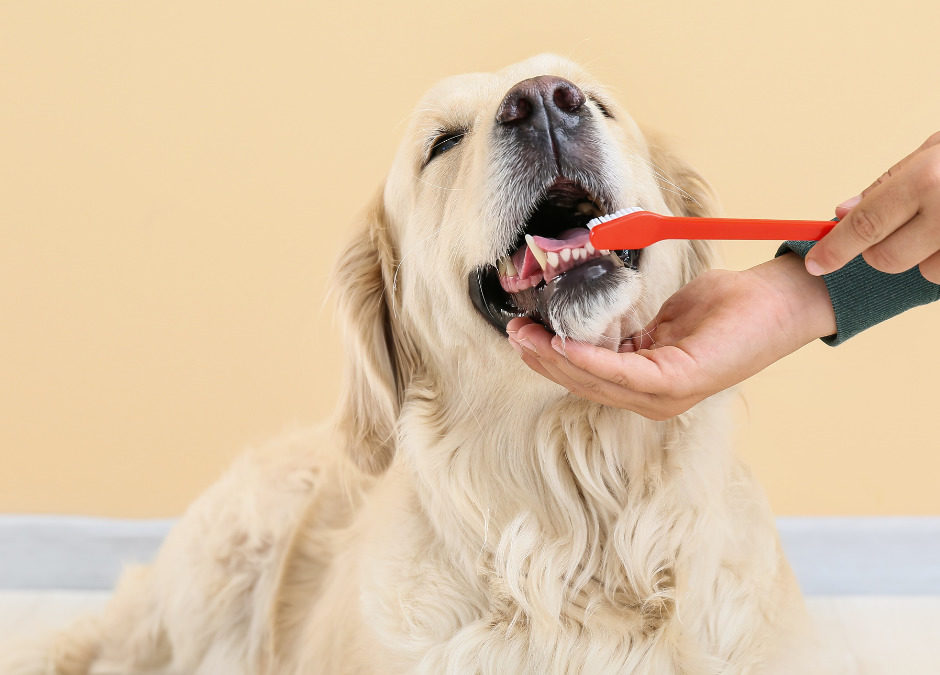Playing with your pets is all fun and games until they jump up and start licking your face – and you realise just how bad their breath smells! Most people will chalk up “dog breath” to being just that: normal dog breath. And it usually is! But just like humans, our pets need proper dental hygiene in order to stay healthy. In fact, pets with good dental health live an average of four years longer than those without!
Poor teeth and gums can lead to a lot of pain and health issues for your best bud, and since they don’t have thumbs, it’s up to us to give them a hand. So here’s some tips on what you can do to make sure your furbaby has the pearliest whites in town.
Where Do Dental Problems Start?
Just like in humans, eating food is the primary cause of tooth decay in pets. Food gathers in the small gaps between teeth, where it gets eaten by naturally-occurring bacteria and becomes plaque, a sticky film over the teeth that can be washed away with brushing. If the plaque isn’t removed, it eventually hardens and becomes tartar, which is much harder to get rid of.
So why is tartar bad? Well, tartar will irritate the pet’s gum line, causing gingivitis (aka bleeding gums) and that all-too-familiar dog breath. If left untreated, that irritation can lead to ulcers, loose and missing teeth, or even to teeth breaking from decay. That kind of thing is really painful, and creates open doorways for dangerous bacteria to enter the pets’ bloodstream, causing very serious and potentially fatal systemic diseases.
What Happens If Dental Problems Aren’t Treated?
It’s a worrying thought, but not keeping your pet’s teeth clean can have some very serious consequences. Like we mentioned above, the earliest stages of plaque buildup can cause bleeding gums and (very) bad breath. This can irritate both you (with the smell) and your cat or dog (with the general discomfort). Also, if your pet likes to chew soft toys, that blood can soak into them and attract pests.
The middle stages of plaque and tartar buildup, such as ulcers and tooth decay, can become quite painful for your pet. Should their teeth need to be removed, it can mean they’ll have to be put on a special diet. If ulcers and tooth decay aren’t treated, it can be extremely painful for them, and quickly cascade into internal problems.
Many pet owners aren’t aware that poor dental health can actually lead to heart problems. The bacteria that feed on plaque and tartar can enter the bloodstream through broken teeth and gum ulcers, then begin to damage the linings of the heart and arteries, causing infection, inflammation and obstruction of blood flow. Heart disease, or endocarditis, can be debilitating and fatal if not treated – and it requires invasive and expensive surgery to treat. If nothing else, this should be what drives you to keep your pets’ teeth clean.
So What Can You Do?
First off, let’s go over a few things you shouldn’t do. It’s a common misconception that bones, including raw bones or deer antlers, are just like a toothbrush for pets’ teeth. This couldn’t be further from the truth! Bones are really hard, and it takes a lot of force for a cat or dog to get through one. That force can break teeth that have even the slightest amount of decay, quickly accelerating all the problems we talked about above. And if your pet does break through the bone, shards don’t get broken down by their digestive system, causing obstructions and punctures to their oesophagus, stomach, or intestines and a five-figure vet bill to match! Both the AVA and the RSPCA have an outspoken no-bones policy, so listen to their advice: do not give your pet bones.
Secondly, human toothpaste was made for humans only, and can be really bad for your pet’s health. Xylitol is a common natural sweetener that makes toothpaste (and things like sports drinks and sugarfree gum) more palatable to us, but it’s very toxic to animals. Using human toothpaste can lead to a seriously upset stomach, and even be fatal for smaller cats and dogs. Your vet can recommend a great pet-friendly toothpaste that your pet will enjoy the taste of, which also makes brushing their teeth much easier.
As for what you should do, well, you should brush their teeth! We promise, it’s not as hard as it sounds – it just takes a little training and positive reinforcement. Here’s what you should do:
- Do not restrain your pet. This can immediately get them defensive and fearful, making them more prone to lashing out. Instead, simply sit on the floor with them. You can gently hold their jaw to keep them still, but don’t be forceful if they want to leave. The next step will help with that.
- Put a little bit of wet food, tuna juice or all-natural peanut butter on your finger and let them lick it off. Try and rub that finger over their teeth, starting at the front and working towards the back. This process can take a few tries until they accept it, so don’t push it and keep the sessions short to start with. Make sure they get lots of praise and scratches so they know how brave they’re being!
- Gradually introduce gauze around the finger, apply some pet dental solution, and gently rub the teeth in a circular motion. Remember, keep it short and simple for now while they get accustomed to the process. For a lot of people, this is as far as their pet will allow, which is totally fine and still great for their dental health.
- If possible, you can now introduce a soft-bristled pet toothbrush, which you can get from just about any pet store or vet. Brush their teeth just like you brush yours! This will give your pet the best results for their oral health.
And that’s it! Some dental treats, like Whimzees, can also help slow down the advance of plaque. Combine these with a vet-approved oral health supplement and regular brushing, and your pet’s pearly whites will be the envy of the whole town!
Support your pet’s oral and physical health with our range of oral hygiene tools, treats, and supplements. Each one is carefully chosen by our team of veterinarians to give your pet the calmest oral hygiene experience and help avoid nasty cavities. Shop our dental range now!

